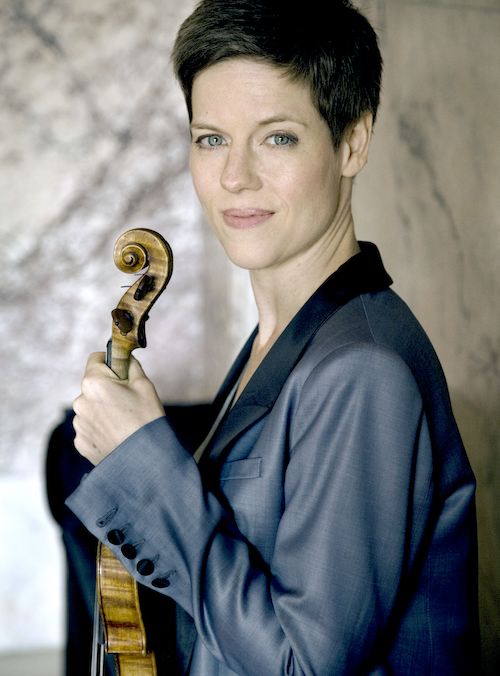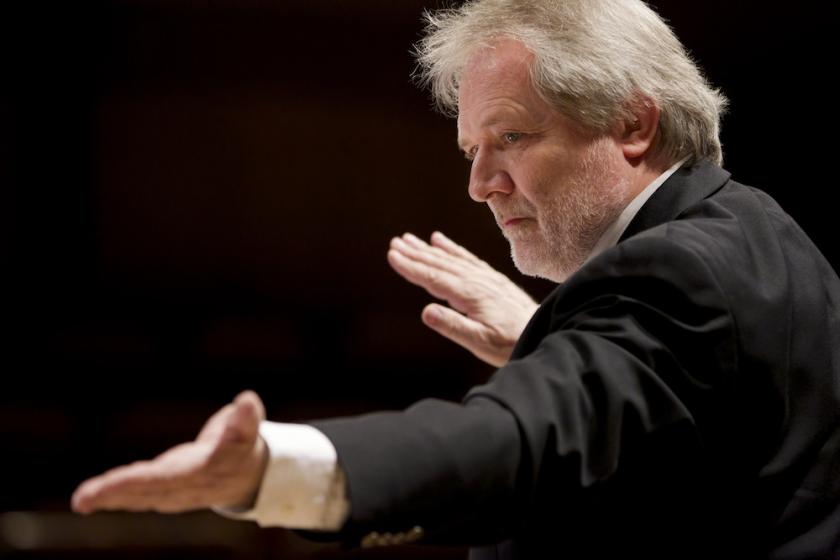By happenstance, this Prom was fully topical, with Debussy’s languorous Prélude à l’après-midi d’un faune fitting for one of the hottest days in London’s history, and the “Infernal Dance” from Stravinsky’s Firebird mirroring the infernal political dance taking place simultaneously in Downing Street.
The official connection between three of the four items was that they were introduced to British audiences by Henry Wood among the “Novelties” he threw at his audiences, between oodles of Beethoven and Brahms. In each case he spotted a winner, and last night they were presented in exemplary performances by the BBC Symphony Orchestra under Peter Eötvös.
There was one novelty for today’s audience, the UK premiere of Eötvös’s Alhambra, his third violin concerto, played by Isabelle Faust. It was an enjoyable piece, if not overtly lovable. Its textures were fascinating from moment to moment but it would need further listening to work out how it all hung together, beyond the fact divulged in the programme that the main melodic material is a cryptogram of the word “Alhambra”. The orchestration was varied, and Faust (pictured below by Felix Broede) matched her tone to what was going on around her: one moment blending a warm sound with the strings, next a brassy sound to play with the horn, then a metallic edge to a dialogue with the percussion.
 Although Eötvös belongs in the modernist tradition – he was assistant to Stockhausen and long-time conductor of Ensemble InterContemporain – Faust found an ebb and flow in the music that is often absent from modernist scores. In this she was aided by Eötvös’s conducting, which was fluid and sympathetic. The mandolin in the orchestra, often shadowing the solo violin, gave a distinctive colour to the orchestration, although Eötvös wasn’t afraid to dispense with the orchestra altogether in the long, fragile solos that bookended the piece.
Although Eötvös belongs in the modernist tradition – he was assistant to Stockhausen and long-time conductor of Ensemble InterContemporain – Faust found an ebb and flow in the music that is often absent from modernist scores. In this she was aided by Eötvös’s conducting, which was fluid and sympathetic. The mandolin in the orchestra, often shadowing the solo violin, gave a distinctive colour to the orchestration, although Eötvös wasn’t afraid to dispense with the orchestra altogether in the long, fragile solos that bookended the piece.
The main highlight of the concert was the orchestral playing, in particular the superlative ensemble achieved in music that is not straightforward to keep together. Individuals also shone through: Daniel Pailthorpe's solo in the Prélude was unforced and unfussy and – at least where I was sitting – perfectly in balance when the orchestra joined him. Eötvös found lots of details in Debussy’s miraculous score – apparently received less than rapturously by the critics at its 1904 London debut.
Bartók’s Dance Suite is a slightly peculiar piece, feeling in places like an off-cut of The Miraculous Mandarin (composed contemporaneously) and a presage of the Concerto for Orchestra. It is shortwinded and episodic, but fortunately those episodes are mostly engaging and sometimes thrilling. In the Dance Suite Bartók combined his usual eastern European folk tunes with some from north Africa, finding similarities and affinities that were played up by fellow-Hungarian Eötvös. There was a cavalcade of melodies, sometimes heard as excellent woodwind solos (a nod here to clarinettist Richard Hosford) and sometimes as lopsided dances for the terrific strings. There is a life-force to Bartók’s music that I find irresistible, and it was here in generous measure.
The finale was Stravinsky’s Firebird Suite, which needs no introduction or special pleading: it is a masterpiece, and an orchestration textbook. The subterranean start was the only fallible moment of the whole evening, but for the most part the orchestra gleamed and glistened. The “Infernal Dance” sizzled in both high and low brass, Eötvös marshalling a swirling burlesque. But the most memorable moments were Felix Eberle’s enchanting bassoon melody in the “Berceuse” and Martin Owen’s pitch-perfect horn solo in the finale.













Add comment